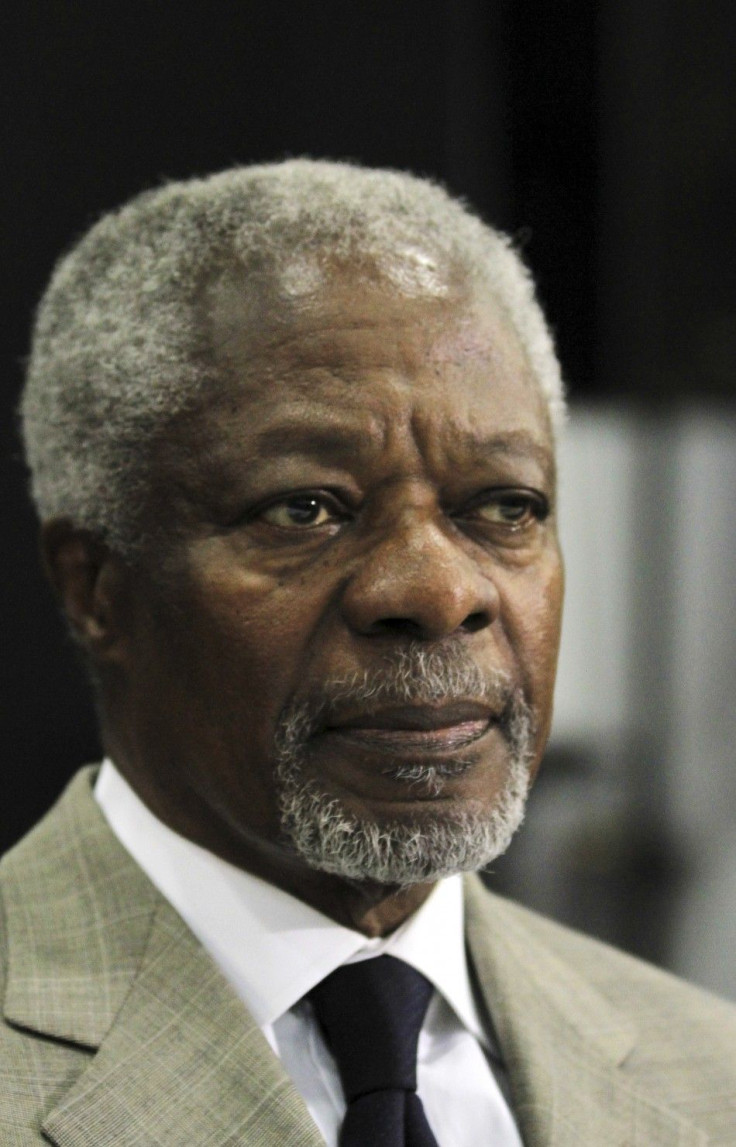Annan Acknowledges UN Mission's Failure In Syria; Clashes Continue

Kofi Annan, the U.N.-Arab League envoy to Syria, acknowledged Saturday that his mission to end the bloodshed had failed, amid reports of heavy fighting in northern Syria.
In an interview with French newspaper Le Monde, Annan said Iran's role in supporting the Assad regime's forces should be watched more closely. He stressed on the importance of Russia in bringing peace to the region.
Evidently, we haven't succeeded, Annan said.
Annan's six-point plan, which called for the government to work in an inclusive Syrian-led political process to address the legitimate aspirations and concerns of the Syrian people, was to be implemented with a ceasefire in mid-April.
The proposal also demanded that humanitarian aid be allowed in for wounded civilians and asked the government to intensify the pace and scale of release of arbitrarily detained persons and provide a list of all places where such people are being held.
Syria was also supposed to ensure freedom of movement and a nondiscriminatory visa policy for journalists.
Three hundred U.N. observers, sent to monitor the ceasefire after President Bashar al-Assad accepted the proposal, had to suspend their work in early June due to escalating violence.
In an earlier interview with the Guardian, Annan said Iran had a greater role to play in resolving the crisis while the Western focus was only on Russia, which has been blocking the U.N. Security Council efforts to reach a resolution.
Russia does have influence and can encourage the Syrian government to implement fully the six-point plan and Security Council resolutions, he said. But this task cannot be left to the Russians alone. I expect Iran to play a role. Those governments -- the U.S. and the Friends of Syria -- that have influence with the opposition should also play a role. If they continue with this destructive competition everyone will lose.
They (the West) accuse the Russians of arming the government. The Russians accuse them of arming the opposition and flooding the place with weapons. This is instead of coming together to see what can be done.
U.N. human rights chief Navi Pillay last week said the flow of weapons to Syrian forces as well as the rebels had intensified the crisis.
The ongoing provision of arms to the Syrian government and to its opponents feeds additional violence, Pillay told the Security Council, as reported by Reuters. Any further militarization of the conflict must be avoided at all costs.
Pillay didn't mention the names of the arms suppliers, although Russia and Iran largely supply weapons to the Syrian regime. Qatar and Saudi Arabia are believed to be delivering arms to the opposition groups while the U.S. maintains that it supplies only non-lethal aid to the rebels.
At the Friends of Syria meeting in Paris Friday, U.S. Secretary of State Hillary Clinton said: I ask you to reach out to Russia and China and to not only urge but demand that they get off the sidelines and begin to support the legitimate aspirations of the Syrian people.
Friends of Syria members urged the Security Council to adopt Annan's peace plan under Chapter VII of the U.N. Charter, which authorizes the Security Council to take action by air, sea, or land forces as may be necessary to maintain or restore international peace and security.
Meanwhile, government forces targeted towns in the northern province of Aleppo, killing 60 people Saturday, the UK-based Syrian Observatory for Human Rights said.
Regime forces are attempting to regain control over this region, where they suffered heavy casualties over the past months, the Observatory said as reported by AFP.
A large number of families have been displaced from the area for fear of shelling and lack of water, electricity and medical services.
Saturday's violence closely followed reports Friday of the killing of 93 people across Syria, as dozens of protesters took to the streets calling for a people's liberation war.
© Copyright IBTimes 2024. All rights reserved.












